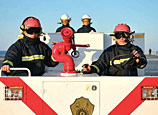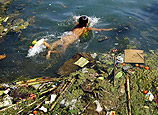
MOST of those infected with the H7N9 bird flu virus have been older people with pre-existing medical problems, putting them at greater risk of getting critically ill or dying, according to China's first comprehensive study of the new virus.
The analysis was led by scientists from Fudan University and was published in the latest issue of the New England Journal of Medicine.
"With the elderly population rising, the study indicates that controlling chronic diseases is also important for controlling infectious diseases," said Shanghai Public Health Clinical Center's Lu Hongzhou, a leading researcher in the study.
The average age of the patients was 61 years, while 42 percent were 65 or older. Male patients were 68 percent of the total.
Studies found 61 percent of the patients had one or more coexisting medical conditions. Heart disease, hypertension, diabetes and chronic obstructive pulmonary disease were the most common.
Scientists studied 111 patients in Shanghai and in Zhejiang and Jiangsu provinces as of May 10. That's 85 percent of all 131 cases reported in China's mainland.
At that point, 30 patients had died, 51 had recovered and 30 remained hospitalized.
Infections slowed considerably last month. By early June, Shanghai had reported 33 human infections. Fifteen had been cured and discharged from hospitals, 15 had died and the remaining three were still being treated, Xinhua new agency reported.
Experts said the risk of death from H7N9 increased among patients who were 65 or older; among those who had an existing medical condition, acute respiratory distress syndrome, shock or an acute kidney injury; and among those who started antiviral therapy more than five days after the onset of symptoms.
Patients hospitalized with H5N1 or H1N1 flu in the past were mostly young people.
Doctors said a possible explanation for the predominance of elderly patients in this outbreak of H7N9 is that retired persons shop more often in wet markets and are therefore more likely to be exposed to live poultry. Besides the increased risk of coexisting illnesses, they are more susceptible to severe forms of disease than younger people, even after the same exposure.
Zhong Nanshan, a leading expert on respiratory diseases in China, said such research is essential for infectious disease prevention and control.
















 1 killed in SW China helicopter crash
1 killed in SW China helicopter crash


![]()
